How to Get a Mortgage During or After Chapter 11 Bankruptcy (2024 Updates)
If you’re recovering from Chapter 11 Bankruptcy, you might feel unsure about your chances of buying or refinancing a home. But the good news is, you can still qualify for a mortgage, whether you’re in the middle of the repayment plan or after it’s been discharged. Let’s dive into how to secure a home loan during and after using FHA and VA loans.
Can You Get a Mortgage During Chapter 11 Bankruptcy?
Yes, getting a mortgage while in a Chapter 11 Bankruptcy repayment plan is possible! FHA and VA loans are two mortgage programs that allow borrowers to get home loans before the bankruptcy is discharged. The catch? You need to be at least 12 months into your repayment plan and have made every monthly payment on time.
If you’re serious about buying or refinancing your home during Chapter 11, you’ll also need approval from the bankruptcy trustee. A manual underwriting process will be required, meaning an underwriter will closely examine your financial situation. The key here is showing stability—proving that you’re financially responsible and on track with your payments.
Navigating Chapter 11 Bankruptcy? Let Us Help You Understand FHA and VA Loan Guidelines!
Contact us today to learn how to qualify for a loan after bankruptcy.Qualifying for a Mortgage After Chapter 11 Bankruptcy
Once your Chapter 11 Bankruptcy is discharged, you might think it’s a long road before qualifying for a mortgage. But that’s not entirely true. While conforming loans (like those from Fannie Mae and Freddie Mac) require you to wait two years after the discharge, FHA and VA loans don’t have such a strict waiting period.
With FHA loans, you can qualify immediately after your Chapter 11 Bankruptcy discharge if you go through manual underwriting. Making timely payments and having a strong financial background can increase the likelihood of being approved for a mortgage immediately. If you’re a veteran or active-duty service member, you might also qualify for a VA loan with no waiting period after discharge, provided you meet certain guidelines.
Important: Even if you’re applying after the bankruptcy is discharged, make sure your payments were on time during the repayment plan. Your approval chances may be negatively impacted by tardy payments.
2024 FHA and VA Loan Guidelines During Chapter 11 Bankruptcy
Both FHA and VA loans have similar guidelines when applying for Chapter 11 Bankruptcy:
- 12 months of on-time payments within the bankruptcy repayment plan.
- Trustee approval to enter into a mortgage agreement.
- The bankruptcy does not need to be discharged.
- The loan must go through manual underwriting.
The manual underwriting process is a bit more detailed compared to automated systems. But it’s designed to give you a fair chance at homeownership.
The Difference Between FHA and VA Loans During Chapter 11 Bankruptcy
- FHA Loans: These loans, supported by the Federal Housing Administration, are tailored for borrowers with low to moderate incomes and frequently have less stringent credit score criteria.
- VA Loans: Veterans and active-duty service members alike can benefit from these loans, which do not require down payment or private mortgage insurance (PMI).
The VA loan program might be your best option if you’re a veteran because of its more favorable terms. Plus, a minimum credit score is required, and you won’t need to put down a huge down payment. Both loan types, however, will require you to show financial stability during the manual underwriting process.
Other Mortgage Options After Chapter 11 Bankruptcy
If you’re ready to apply for a mortgage after your Chapter 11 Bankruptcy is discharged, you’re not limited to FHA and VA loans. You might also want to look into Non-QM loans (Non-Qualified Mortgages) if you need to meet the requirements for a traditional loan. Non-QM loans don’t have a strict waiting period after bankruptcy discharge, making them an appealing option for many borrowers.
Non-QM Loans After Chapter 11 Bankruptcy
Non-QM loans allow you to skip the long waiting periods required by conventional lenders like Fannie Mae and Freddie Mac. These loans often have flexible qualifying standards, especially if you’ve experienced Chapter 11 Bankruptcy. You might qualify based on your income, assets, or payment history, even if your credit score isn’t ideal.
2024 FHA Loan Waiting Periods After Bankruptcy
The FHA loan program has a waiting period after different types of bankruptcies, but it’s generally more forgiving than conventional loan programs:
- Chapter 7 Bankruptcy: After being discharged, you must wait at least two years before applying for an FHA loan.
- Chapter 13 Bankruptcy: If you’re in a Chapter 13 repayment plan, you can qualify for an FHA loan after 12 months of on-time payments, provided you have trustee approval. The bankruptcy doesn’t need to be discharged.
- Chapter 11 Bankruptcy: There’s no official waiting period after discharge for Chapter 11, but you’ll need to go through manual underwriting if the discharge was within two years.
What Are the “Extenuating Circumstances” for FHA Loans?
In some cases, FHA loan guidelines allow borrowers to bypass the typical waiting periods after bankruptcy if they’ve experienced extenuating circumstances. These are events that were outside your control, such as:
- Serious illness or injury affecting your ability to earn income.
- Job loss or significant income reduction due to layoffs or company closure.
- Divorce that caused financial hardship.
- Natural disasters that led to property damage or loss of income.
If you can prove extenuating circumstances and show that you’ve been responsible with your finances since the event, you may qualify for a mortgage sooner than expected.
Chapter 11 Bankruptcy Doesn’t Have to Stop You from Getting an FHA or VA Loan!
Reach out now to explore your options and get expert advice on how to qualify.How Does Chapter 11 Bankruptcy Work?
Before you start the mortgage process, it’s important to understand how Chapter 11 Bankruptcy works and how it differs from other types of bankruptcy.
Chapter 11 bankruptcy, commonly known as reorganization bankruptcy, enables people and companies with substantial debts to adjust their financial responsibilities while still running their operations.
Chapter 11 offers greater flexibility in handling debts compared to Chapter 7, which eliminates most debts, and Chapter 13, which presents a structured repayment plan.
- Businesses: Typically, companies use Chapter 11 to reorganize their debts and continue operations. The goal is to get back to profitability while managing debts.
- Individuals: Although less common, individuals—particularly those with substantial real estate holdings or high unsecured debts—can also file for Chapter 11.
How Long Does the Chapter 11 Repayment Plan Last?
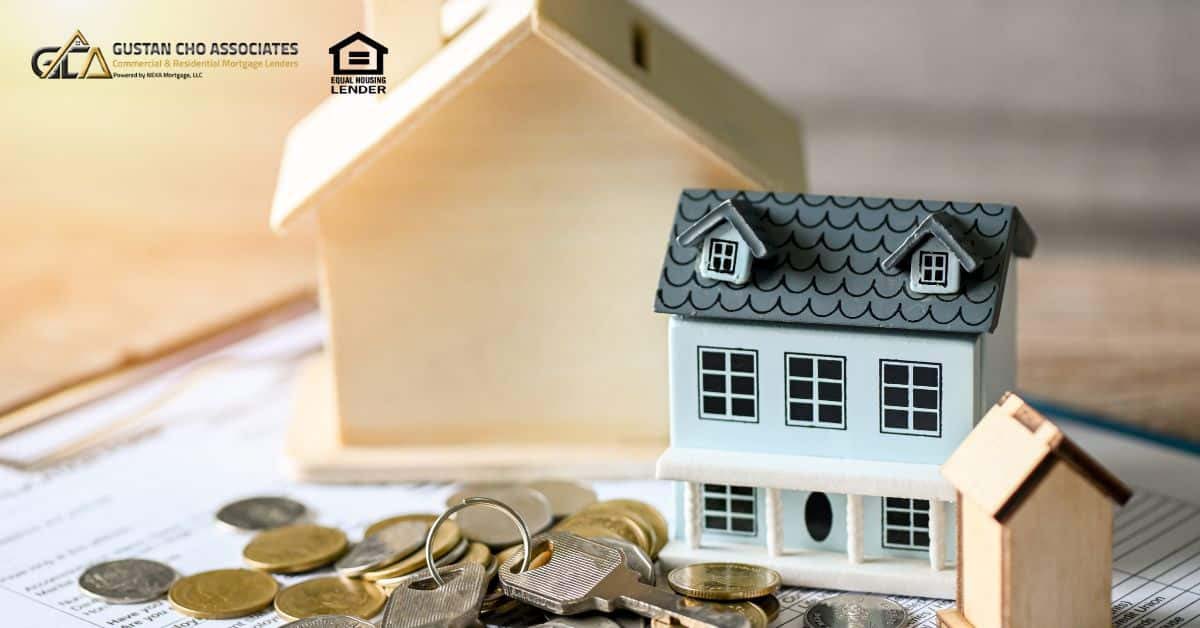
Why Choose Chapter 11 Bankruptcy?
Filing for Chapter 11 Bankruptcy is often a strategic move for high earners and real estate investors. If you’ve accumulated a lot of unsecured debt or own significant real estate, Chapter 11 allows you to reorganize your debt, restructure your mortgage, and avoid foreclosure. It also enables you to potentially lower your monthly payments and reduce your interest rate, giving you more breathing room to regain financial control.
Why Choose Chapter 11 Bankruptcy?
Filing for Chapter 11 Bankruptcy is frequently a calculated decision for individuals with high income and those involved in real estate investments. If you’ve accumulated a lot of unsecured debt or own significant real estate, Chapter 11 allows you to reorganize your debt, restructure your mortgage, and avoid foreclosure. It also enables you to potentially lower your monthly payments and reduce your interest rate, giving you more breathing room to regain financial control.
How Chapter 11 Bankruptcy Can Help Real Estate Investors
One of the biggest advantages of Chapter 11 Bankruptcy is the ability to restructure your mortgage debt. For example, if you own a property worth $100,000 but owe $200,000 on the loan, Chapter 11 allows you to reduce the principal balance to the current property value of $100,000. You may also be able to lower the interest rate and extend the repayment term, making the monthly mortgage payment much more affordable.
FHA Chapter 11 vs. Chapter 13 Bankruptcy Guidelines
Both Chapter 11 and Chapter 13 Bankruptcy are federal debt repayment programs that cater to different financial situations. Chapter 11 typically deals with individuals or businesses with higher debt levels. In contrast, Chapter 13 aims at people with more moderate debt who have a regular income.
Here are some key differences:
- Debt Limits: Chapter 13 has debt limits of $1,184,200 in secured debts and $419,275 in unsecured debts, while Chapter 11 has no such limits.
- Trustee Involvement: In Chapter 13, a trustee is assigned to handle your repayment plan, collect payments, and disburse them to creditors. In Chapter 11, creditors often have a say in the restructuring plan, and there’s typically no trustee unless requested.
- Repayment Terms: Chapter 13 repayment plans last 36 to 60 months, while Chapter 11 plans are more flexible and often completed in 24 months or more.
Final Thoughts: Getting a Mortgage After Chapter 11 Bankruptcy in 2024
Whether you’re in the middle of a Chapter 11 Bankruptcy repayment plan or have recently been discharged, you still have mortgage options available. FHA and VA loans remain your best bet during the bankruptcy process, offering flexibility, no waiting periods after discharge (in some cases), and manageable down payment requirements.
Take the next step by consulting with an FHA-approved lender specializing in borrowers recovering from Chapter 11 Bankruptcy. They can help you navigate the process, guide you through manual underwriting, and find the best loan program for your needs.
Don’t let your bankruptcy hold you back from homeownership—2024 could be the year you get back on track and into your dream home! Contact us at 800-900-8569 or email us at alex@gustancho.com to get started!
Frequently Asked Questions About Chapter 11 Bankruptcy:
Q: Can I Get a Mortgage During Chapter 11 Bankruptcy?
A: Yes, you can get a mortgage during Chapter 11 Bankruptcy if you’re at least 12 months into your repayment plan. You must also have made all payments on time and get approval from the bankruptcy trustee.
Q: What are the Mortgage Options for Someone Recovering From Chapter 11 Bankruptcy?
A: FHA and VA loans are the best mortgage options during or after Chapter 11 Bankruptcy. These loans have more flexible requirements and no strict waiting period after discharge.
Q: How Does Manual Underwriting Work for Chapter 11 Bankruptcy?
A: Reviewing your financial situation manually includes a detailed look at your payment history during Chapter 11 Bankruptcy. You must demonstrate that you have been financially stable and responsible during the repayment plan.
Q: Can I Get a VA Loan During Chapter 11 Bankruptcy?
A: A veteran or an active-duty service member may qualify for a VA loan even if you are in Chapter 11 Bankruptcy, as long as you have made 12 months of timely payments and have obtained approval from your trustee.
Q: How Long After Chapter 11 Bankruptcy Discharge Can I Apply for an FHA Loan?
A: After your Chapter 11 Bankruptcy discharge, you can apply for an FHA loan. You will need manual underwriting if the discharge occurred less than two years ago.
Q: What are Non-QM Loans, and Can They Help After Chapter 11 Bankruptcy?
A: Non-QM loans are an option after Chapter 11 Bankruptcy and do not require the long waiting periods associated with conventional loans. They often have flexible criteria based on income, assets, or payment history.
Q: What is the Difference Between Chapter 11 and Chapter 13 Bankruptcy for FHA Loans?
A: Both Chapter 11 and Chapter 13 Bankruptcy enable you to request FHA loans, but Chapter 11 is usually chosen by individuals with substantial debt and investments in real estate. Chapter 13 has stricter repayment schedules and debt limits.
Q: Do I Need Trustee Approval to Get a Mortgage During Chapter 11 Bankruptcy?
A: During Chapter 11 Bankruptcy, you can get a mortgage with the approval of the bankruptcy trustee. The process involves manual underwriting to ensure financial stability.
Q: Can Real Estate Investors Benefit from Chapter 11 Bankruptcy?
A: Real estate investors can use Chapter 11 Bankruptcy to restructure their mortgage debt, reduce their monthly payments, and lower their interest rates to regain financial control.
Q: What Happens if My Payments are Late During Chapter 11 Bankruptcy?
A: If you miss payments during your Chapter 11 Bankruptcy repayment plan, it can negatively impact your chances of qualifying for a mortgage, even if you apply after the bankruptcy is discharged.
This blog about “Chapter 11 Bankruptcy Guidelines on FHA and VA Loans” was updated on September 27th, 2024.


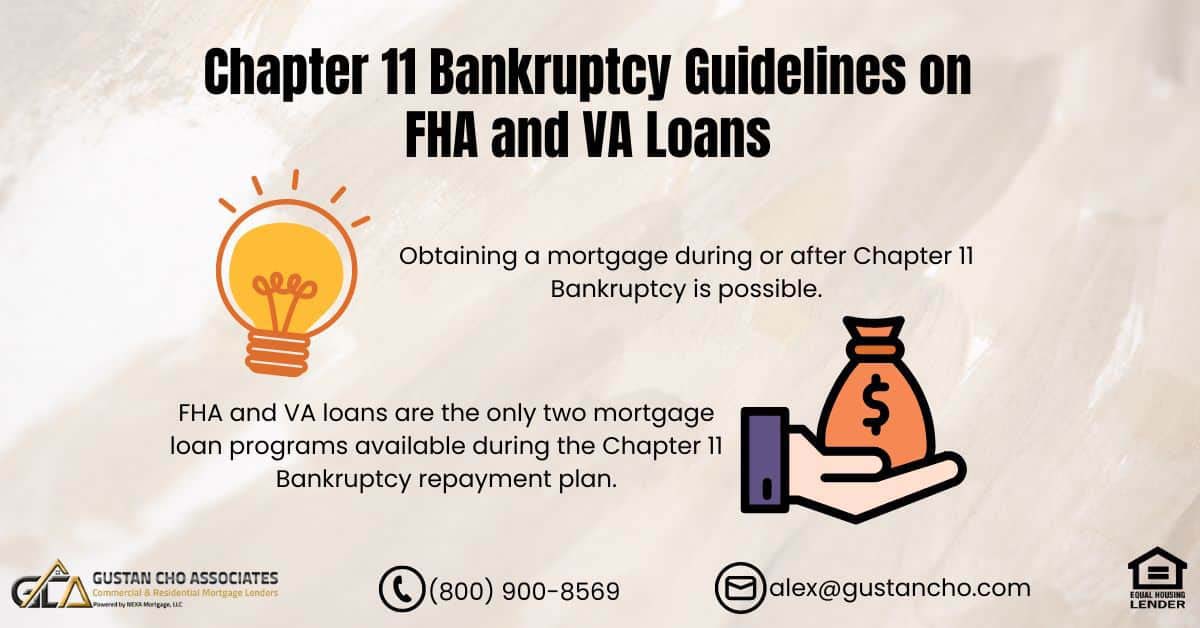

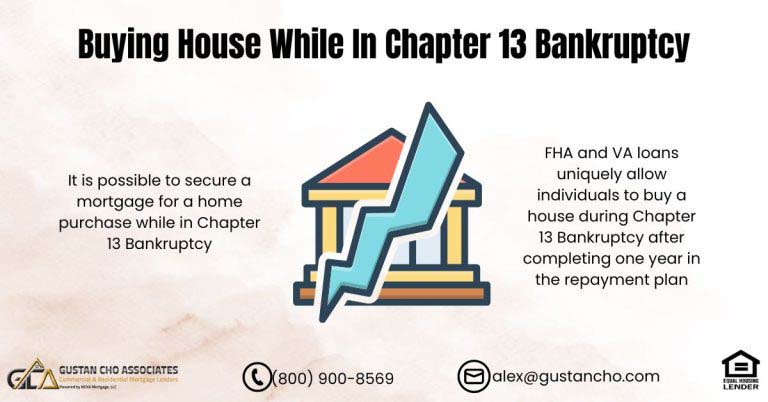
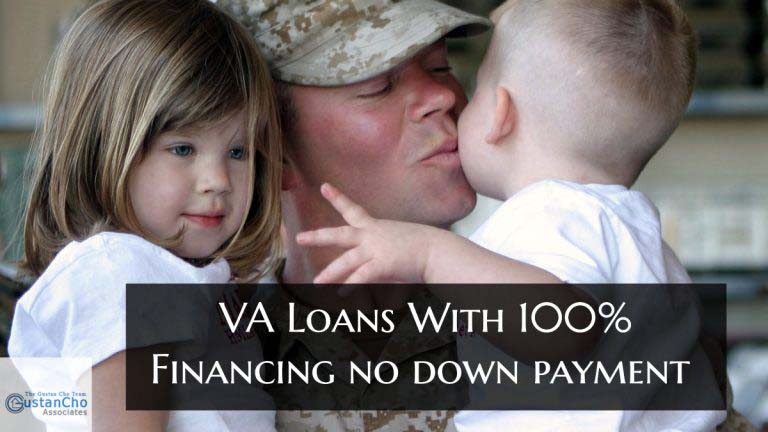

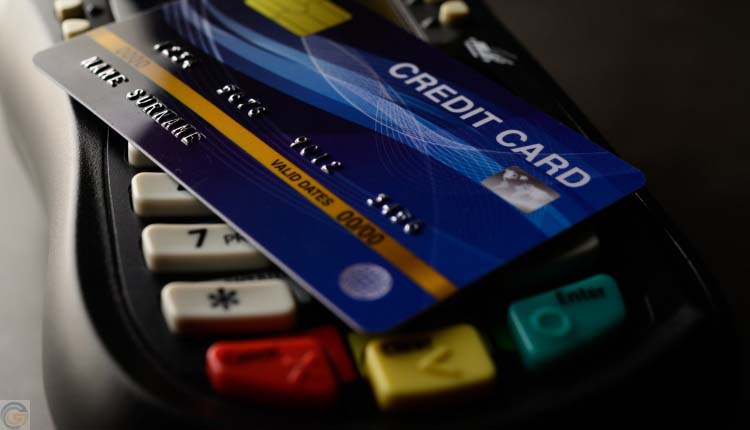


I would like to talk to a loan officer to see if I might qualify for a loan of approx $$1,200,000. I am currently in Chapter 11 sub 5. Office #423-745-9789 or cell 423-887-4609. I will be available next week Mon-Fri. by phone or email. Thank you.
Please contact Alex Carlucci at 630-915-7550 or email Alex at alex@gustancho.com.